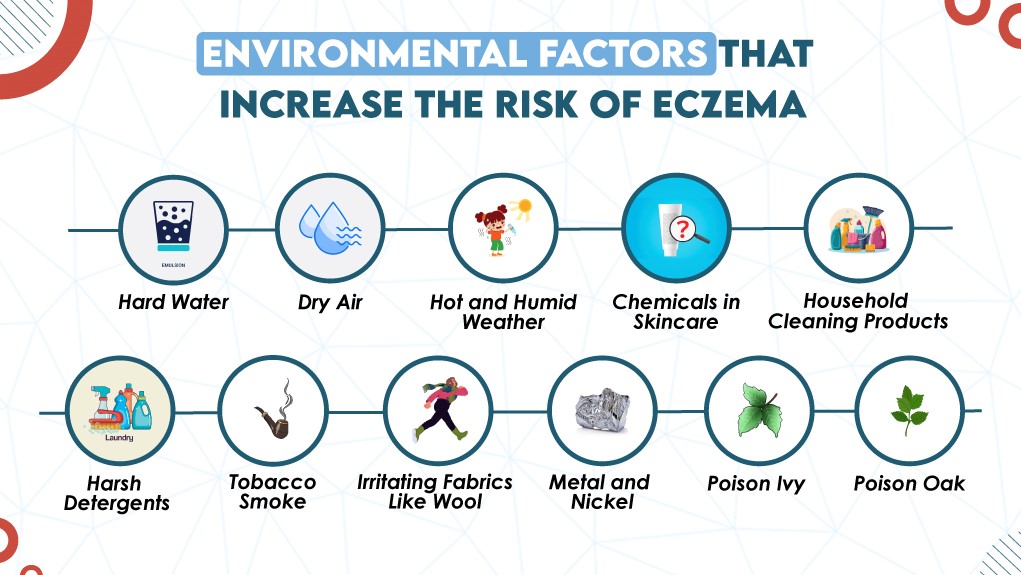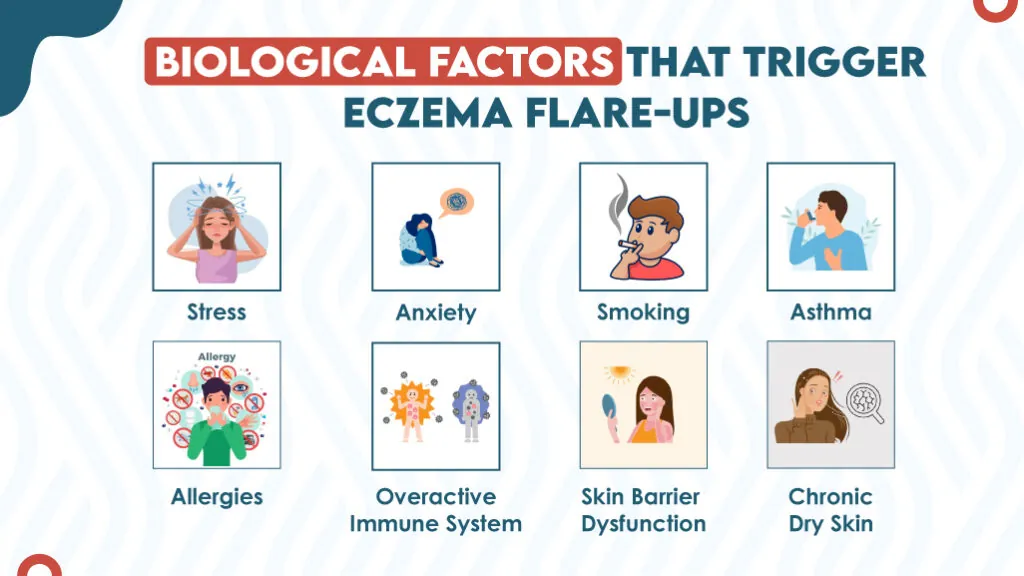
Atopic dermatitis, otherwise known as eczema, is a skin condition that causes skin inflammation and irritation in the form of red, dry, and itchy rashes that come and go. Eczema usually begins in early infancy and usually goes away in adolescence, though some individuals continue to have eczema flare-ups well into adulthood.
However, if the question, “Is eczema a genetic disorder?” has been on your mind for a long time, read this blog to discover the truth from an experienced pediatrician.
Is Eczema Genetic?
There is no one exact proven cause of eczema, though it is most likely partially a genetic disorder and partially brought on by environmental triggers.
Research has shown that around 30% of people with eczema also have a gene variation that impacts the skin’s top layer and makes it more difficult for the skin to maintain moisture levels and fight off potential irritants.
Plus, people with eczema have also been shown to have an increased risk of other inflammatory conditions like rheumatoid arthritis, inflammatory bowel diseases, and alopecia areata.
This suggests that eczema is at least a partially genetic disorder. There are two ways in which genetics can impact eczema.
- Genetics Affecting Skin Barrier Function
Fillagrin is a protein in our body that makes our skin barrier strong, helps it retain moisture, and protects the epidermis from harmful irritants outside. According to research, mutation of a certain type of gene known as KIF3A or FLG gene can cause your cells to produce less fillagrin.
Making it difficult for your skin to stay moisturized and more prone to infection, allergy and developing dry, irritated, itchy skin associated with eczema.
- Genetics Affecting the Immune System
Genetics can also influence your immune system. Mutation in genes like IL-4 and IL13 can increase your towards certain allergens, which causes an overactive immune system. Also, a variation in the IL31 genes can trigger the production of cytokines in your body. These cytokines are responsible for causing the inflammation and intense itching.
Eczema Runs in Families
Babies that have eczema also usually have parents who also suffer from the condition. The fact that eczema runs in families suggests that genetics play a role in its development.
In fact, a big risk factor for developing eczema is having family members who have had eczema, hay fever, asthma, food allergies, or any other allergic conditions. Around 70% of kids with eczema have a family history of eczema.
If one parent has eczema, allergies, or asthma, there is a 2x to 3x higher probability that their child will have eczema. If both parents have eczema or similar conditions, there is a 3x to 5x higher chance that their child will have eczema.
However, if you develop eczema even though no one else in your family has ever had it, don’t be surprised. Genetics is not the only cause of eczema there are other factors that could be causing your itchy, red, irritated eczema rash.
What Causes Eczema?
A gene variation can make it harder for the skin to protect itself from irritants. It is one risk factor that makes you prone to developing eczema. The gene that triggers eczema may be present in your body, but it won’t cause eczema until it is exposed to a certain trigger.
These triggers can be either environmental or biological.
Biological Factors That Trigger Eczema Flare-ups
Some common biological factors that can trigger an eczema flare-up are:
- Stress
- Anxiety
- Smoking
- Asthma
- Allergies
- Overactive immune system
- Skin barrier dysfunction
- Chronic dry skin
Environmental Factors That Increase the Risk of Eczema

The list of environmental factors is very long. However, some of the most common ones that may increase your risk of eczema are:
- Hard water
- Dry air
- Hot and humid weather
- Chemicals in skincare products
- Household cleaning products
- Harsh detergents
- Tobacco smoke
- Irritating fabrics like wool
- Metal and nickel
- Poison ivy
- Poison oak
These are some of the most common factors that could be contributing to your eczema. Finding your trigger can be very hard. However, you can consult a dermatologist, and they can help you pinpoint the cause with a patch test.
Treating Eczema
There is nothing you can do about your genetics. But there are steps you can take to relieve eczema symptoms and prevent future flare-ups.
The two most essential things you must do are avoid the triggers and follow an eczema skincare routine.

Avoid the Triggers
We know it can be pretty hard to pinpoint your eczema trigger. However, it’s not impossible for you to figure it out with the help of a doctor. You can also keep track of when your eczema gets worse; for example, some people notice that their symptoms worsen once the weather starts to get cold and the air becomes dry.
So, once you know what your trigger is, try avoiding it to prevent future flare-ups.
Bathing
- Take a bath once daily in lukewarm or cool water.
- Cleanse your skin with a gentle eczema body wash to prevent irritation.
- Make sure the eczema shampoo or body wash you are using is fragrance-free, sulfate-free, paraben-free, and dye-free so it won’t further irritate your skin.
- If you are taking a bath daily, keep it short, a maximum of 10 mins.
- Avoid taking long hot baths or spending time in the hot tub, as it can further exacerbate your condition.
- After bath time, gently pat dry your skin with a soft towel and apply an eczema cream or ointment while the skin is still damp to lock in the moisture.
Moisturize
- Moisturize your skin at least twice daily with a fragrance-free eczema moisturizing cream.
- If you notice that your skin is getting dry more often, use an emollient more than twice daily.
- If you wash your hands quite often, remember to moisturize them after every wash.
- Don’t forget to moisturize your skin after taking a bath.
- Avoid using moisturizing lotions with appealing fragrances. Instead, use one that is free from harsh chemicals like fragrance, dyes, parabens, and sulfates.
If you suspect that your condition is not getting better after following a proper skincare routine, then consult a doctor. They will accurately diagnose your condition, and there is a chance you are experiencing skin conditions that look quite similar to eczema, like psoriasis and rosacea.
Or your eczema is severe and needs the use of topical steroids, antihistamines, and calcineurin Inhibitors. Or biologics, along with skincare to soothe your symptoms.
Conclusion
The simple answer to the question is eczema hereditary? is yes. Some people are more prone to developing eczema because they have inherited it from their parents due to a gene mutation.
However, genetics is not the only cause of eczema. Some people who don’t have a family history of eczema can also develop it due to environmental triggers and other risk factors such as an overactive immune system and impaired skin barrier.
No matter what might be causing your eczema, your ultimate goal should be how to soothe it. You can easily do this by keeping your skin moisturized with an eczema moisturizer and taking a bath daily with a body wash for eczema.
If you are unsure about anything, then it is best to consult a doctor rather than take risks.
FAQs
Is eczema inherited from mom and dad?
If one of your parents has eczema, you have two times the chances of developing eczema become, while if both parents have a history of eczema, then your chances increase 5 fold.
You may inherit genes that could cause eczema, but they won’t activate until you come in contact with an irritant or a trigger.
Why did I suddenly get eczema?
If you are suddenly experiencing eczema even though you are an adult. One possibility is that you may have a family history of eczema and may have inherited it from them.
The genes that cause eczema were always present in your body, and now that your skin is exposed to the trigger, it may have activated the genes and caused itchy, irritated, red rashes.
Who mostly gets eczema?
People who are more prone to getting eczema are the ones who have a family or health history of atopic dermatitis, hay fever, asthma, or allergies.
What are the odds of inheriting eczema?
The odds of inheriting eczema are that if one of the parents had a history of eczema, then there is a 1 in 4 chance that the child will have eczema. If both the parents had eczema, then it's a 1 in 2 chance.
Should I have eczema if I have children?
There is generally no risk of having children or pregnancy if you have eczema. However, it's important that you always follow a proper skincare routine, avoid the triggers, and keep your skin moisturized to prevent eczema flare-ups.

